Selection Bias no. 3: On time
Dear friends,
(If you're new to this newsletter, welcome; I added you to the list because I thought this might be something you'd enjoy receiving. You can read all two of my previous newsletters here and here, or scroll to the bottom to unsubscribe. If you're old to this newsletter, welcome back; and yes I am still writing these things, however infrequently.)
It's been six months since my last newsletter, and much has happened in the interim: I left California and moved to Toronto, I took up a new job as a postdoc at UofT, I visited Turkey and a number of North America's national parks, I started teaching a class on ancient Greek sexuality. That's one way of summing up my past half-year. It's how the past now looks from the present. But it hardly captures how the past looked in the past. And as it happens, I've also spent a lot of the past six months dwelling on precisely this issue, thinking about time and the presence and absence of the past in the present.
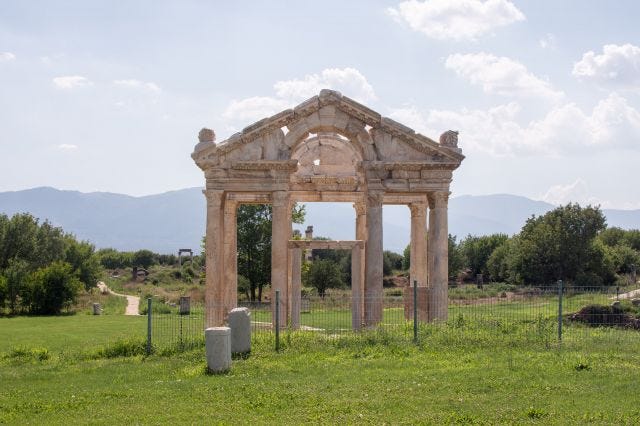
Tetrapylon, Aphrodisias, Turkey
These thoughts began for me in June, when I visited Turkey, a country that wears its history on its sleeve (though the sleeve conceals an armful of even more history underneath). Nowhere else that I've been has the past felt so palpable – and not just some distant past, preserved in an UNESCO amber, but a dynamic and diachronic past, a cross-sectional fossil record, as it were. This was most true of Istanbul, that architectural palimpsest of a city, where mosque sits atop Byzantine church and the walls of a former Genoese colony poke out amidst bustling city streets. But it was also true of my wider travels to see the remains of the ancient hometowns of the ancient philosophers, places like Miletus, Ephesus, and Aphrodisias, cities which now stand in various states of (dis)repair, ranging from painstaking excavation to archaeological reconstruction to touristic spectacle to utter neglect. And yet the conspicuousness of all this history only made the past harder to see. Or rather, I never quite knew what I was seeing. The past was present, but also repurposed and rearranged.
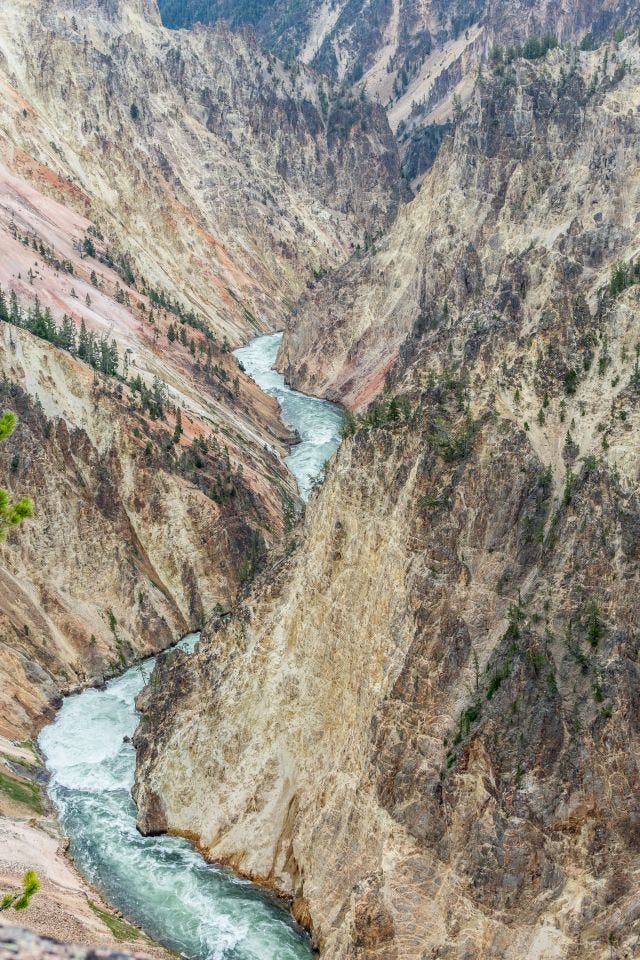
Grand Canyon of the Yellowstone
Such thoughts stayed on my mind through the month of July, as I travelled from California to Ontario by way of Yosemite, Yellowstone, Glacier, and Banff National Parks. As much I love the national parks, for a long time now I've also found something heartbreaking about them, in how these grand monuments to beauty, nature, and the preservation of the North American wilderness are built on a foundation of land theft and genocide; in how, to protect these areas against the destructive forces of greed and exploitation, the only solution the parks' early proponents could envision was to cleanse them of all human presence; in how the parks' first settlers stood in awe only of the beauty of the land, and not also of the beauty of how the original inhabitants lived with the land. Unlike in the case of Turkey, this is a history that the parks seem designed not to let us see, offering up instead a romantic vision of the past, a glimpse of the wilderness as it "originally" was, despite these origins being illusory. In this case, the preservation of one part of the past has come at the cost of the erasure of another.
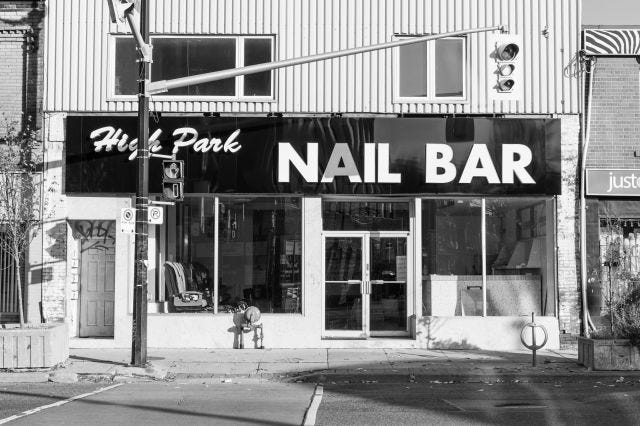
3114 Dundas St W
These thoughts took on a new form in August, when I arrived in Toronto, a city which for me is suffused with my own experiences of the past, my own personal history. This is the first time in my life I'm returning to live in a place I've lived before, and I didn't realize how much my experience of living here now would be shaped and enhanced by this fact. Though being in Toronto has always filled me with a certain exhilaration, it now has the added exhilaration of familiarity and memory, of seeing not only what's present but also what's changed. Here the past feels ever-present, though it's only my past, and, I suppose, my present, too.
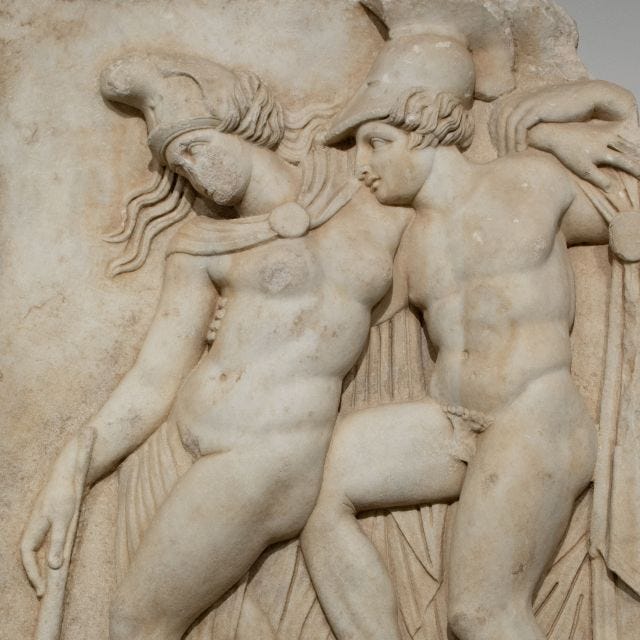
Achilles & Penthesilea, Aphrodisias Museum
These ideas have taken on yet another shape in recent months, when I've been in the classroom again and as usual trying to regain some part of the past from the present, this time focusing on the topic of sexuality in ancient Greek thought (syllabus here, if you're interested). What I've always loved about teaching the history of philosophy, however, is that it's never just about regaining the past; for me, and for most other historians I know, it's also about better understanding the present, by grappling with the foreignness of the past. It's a process, that is, not only of seeing the past from the present, but also of seeing the present in the past. And this has been especially true of teaching ancient Greek sexuality, which throws so much of our own present assumptions about sexuality into relief.
That brings us to the present moment. I don't know what more to say. These reflections were not intended to build to any grand conclusion; they were just one way of capturing my past six months from the present. Here's another way: with a summary of the best things I've read, heard, and seen in that time. Which brings us to the second part of this newsletter: my latest list of recommendations from the wide world of contemporary arts and letters.
~~~
WORDS // SPOKEN
"No", from The Heart / "In The No", from Radiolab This miniseries will be old news to some of you, but I cannot not lead with it, because I just discovered it and it's simply the best piece of radio I've heard, ever. It's also the most honest and perceptive piece I've come across of any sort on the issues of consent, patriarchy, and everything in between. Part II of Radiolab's follow-up series is also jaw-droppingly good, a heated unedited interview that, if you put it on stage, could pass as a Mamet play. (A heads-up: This series, as host Kaitlin Prest warns, "could potentially be really triggering... but could also make you feel less alone.")
Bundyville Remember back in 2016, when an anti-government militia briefly occupied a wildlife refuge in Oregon? Thanks to journalist Leah Sottile, we now finally have enough perspective to make sense of what that was all about. This seven-part series is a much-needed clarification of a complex event in the nation's recent history, refracted prismatically so as to illuminate the nation's entire history, and a riveting portrait of a distinctively American kind of psychopathology.
"Lost Locusts", from The Memory Palace Good podcasts are many things: informative, memorable, personal, addictive. Rarely are they ever beautiful. Nate DiMeo's The Memory Palace is consistently the exception that proves this rule, and this episode is possibly his most beautiful yet. Plus it'll teach you more than you ever knew you wanted to know about the Rocky Mountain locust.
"My Effing First Amendment", from This American Life On the hot-button issue of free speech on campus, this is the single best thing I've come across in the recent months. This hour-long episode doesn't arrive at any answers, but it doesn't pull any punches, either, taking all sides to task and showing just how complicated and messy this all-too-often oversimplified issue is.
"Church Planting", from StartUp Who would've thunk that the business ethos of Silicon Valley has now taken to disrupting even our places of worship? Church planters, that's who. If this sounds intriguing to you, I'd highly recommend you give a listen to Eric Mennel's recently produced season of StartUp. It gives whole new meaning to the term "angel investor".
WORDS // LONG FORM
I read a number of good books in the past six months, though nothing that quite stood out as an absolute must-read. So, in lieu of my usual dive deep into a select few amazing novels, here's a quick list of several honourable mentions:
Asymmetry by Lisa Halliday Come for the salacious peek into Halliday's erstwhile affair with Philip Roth; stay for the brilliant examination of the nature of fictional creation.
Motherhood by Sheila Heti A welcome return from my favourite Torontonian weirdo. (Another welcome return: in August, Podcast with Raisins, Heti's on-again-off-again (but mostly off-again) podcast, broke its three-year hiatus.)
Florida by Lauren Groff I fell in love with Groff's writing three years ago, when her story 'Ghosts and Empties' appeared in The New Yorker. That story, and many other just as magnificent ones, comprise her latest collection, Florida.
His Favorites by Kate Walbert A prep school campus novel, a #MeToo cri de cœur, but mostly just a beautiful piece of writing and a powerful meditation on memory and the (re)construction of experience.
Get In Trouble by Kelly Link Last month the MacArthur Foundation unveiled their 2018 class of "genius" fellows, with Link appearing as their resident short story writer. I hadn't read or even heard of any her work previously, but I found this collection unique and often quite moving, and her writing something like a cross between George Saunders and Neil Gaiman.
Transit & Kudos by Rachel Cusk I file these as mere honourable mentions only because I already gushed so much about Cusk's Outline, the first book in this plotless trilogy, in my last newsletter. Literature just doesn't get any better than this in my opinion, and I loved Cusk's second and third volumes just as much as her first.
Paradise Lost by John Milton I know, I know, people have been raving about this one for, like, literally hundreds of years. But I had never read it before, and, as it turns out, this is the greatest work ever written in the English language. Who knew.
WORDS // SHORT FORM
"You Think You Want Media Literacy... Do You?" by danah boyd & "Fake News: Why Mainstream Journalism Is Often Part of the Problem" from the Vim Blog Both of these pieces were first published a while ago, but I only came across them in the last month, and they're still two of the best pieces I've ever read on the topic of fake news (etc.). The first, a keynote address by the technology & social media scholar/wunderkind danah boyd, rightly calls foul on the pollyannaish idea that all we need to remedy the "problem of fake news" is "media literacy" and "critical thinking". The second, from one of the pseudonymous contributors over at the Vim Blog, argues that, if "fake news" is going to mean anything, it needs to be taken to refer, not just to news that is produced with misleading intent, but more broadly to any journalism whose interests lie in anything other than accurately representing the truth (a definition which, as you might've guessed, makes a lot more than just the Daily Stormer turn out to be fake news). More than the specifics of their particular arguments, however, what I most appreciated about these pieces was how each in its own way highlighted how the way in which the mainstream media has taken to talking about fake news perpetuates the very media ecosystem that precipitated the recent rise in media scepticism.
"In a Quizzical Spirit: An Interview with Stephen Yablo" by Daniel Kodsi This essay/interview is essentially just a series of quotes and quips from contemporary philosopher Stephen Yablo – and that's precisely what makes it so great. It opens with the best definition of a philosopher I've ever heard ("someone who says, 'Here is a thing that's happening everywhere, all the time, throughout human history – it's just really hard to think of a good example'"), and just keeps getting better from there.
SOUNDS // LONG PLAYS
Daniel Caesar, Freudian This album, released in August of last year, totally evaded my radar until recently, which is a shame since it's such a joy to listen to, a warm, generous, and funky record of top-notch secular gospel R&B. It's easy to hear in Caesar a number of his contemporaries: the smooth vocals of Frank Ocean, the soulful grooves of Leon Bridges, the choral ecstasy occasionally heard in Chance the Rapper. But while Freudian certainly draws on these and many other influences, it is far from derivative, bringing all its elements together into a singular sonic and lyrical focus.
Pusha T, DAYTONA Taut, ferocious, and sonically adventurous. This record dropped a couple weeks after my last newsletter, but no better rap album has come out since.
On the electronic side of things, three records have been in heavy rotation for me in recent months: Jon Hopkins, Singularity, the latest from the IDM master; DJ Boring, For Tahn, a short EP of exactly the kind of house that I go for; and Shinochi Atobe, Heat, which for me sits on the just-listenable edge of the house & techno avant garde.
SOUNDS // EXTENDED PLAYS
"Two Slow Dancers", by Mitski An arresting ballad, which still gives me shivers every time. From no more than an electric piano, some synth strings, and her breathy voice, Mitski conjures up a world of emotion, and not just those old pop standbys of love and regret, but also nostalgia, irony, and folly. It's still a bit too early to call, but I strongly suspect that, come December 31, this will be at the top of my list of the year's best songs.
IMAGES // MOVING
Free Solo by Elizabeth Chai Vasarhelyi & Jimmy Chin What does it look like to climb up the face of El Capitan with only a bag of chalk tied around your waist? And who in the world would attempt such a thing? For the answers to these questions and more, one need look no further than Free Solo, a recently released documentary that chronicles Alex Honnold's famed ropeless climb up El Cap's Freerider in June of 2017. Though part of my enjoyment of the film definitely came from my own enthusiasm for climbing, Free Solo is not just for rock rats; ultimately what I found most impressive about the movie was how indelibly it captured the beauty of Yosemite, how starkly it portrayed the psychology of its protagonist, and how effectively it conveyed the abject terror of free solo climbing. (And if Free Solo isn't playing in your city, you might also try The Dawn Wall, the other great climbing movie in theatres this month.)
A PARTING PHOTOGRAPH
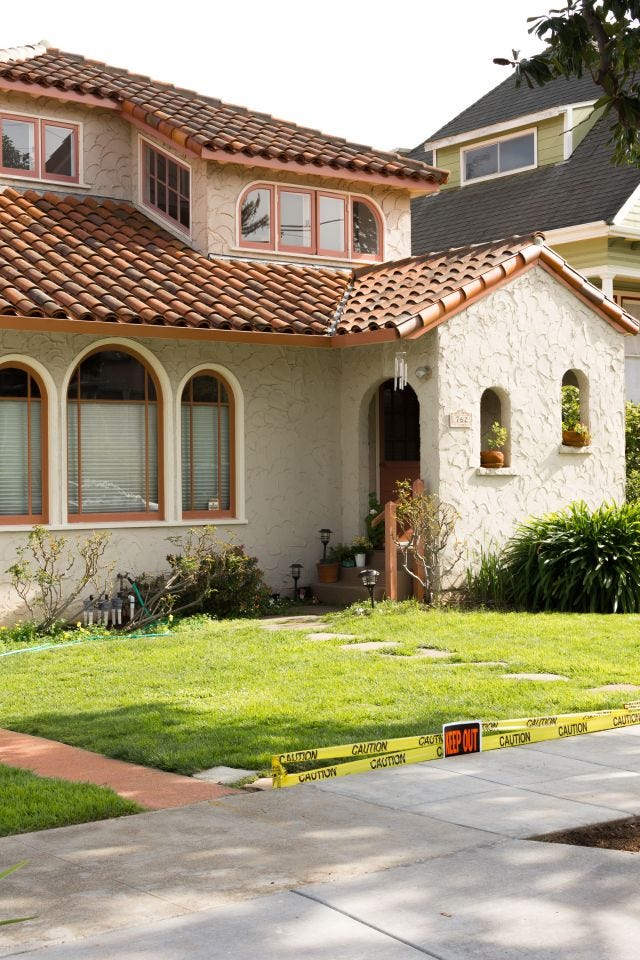
Ciao, Palo Alto
Till next time,
W
P.S. If you'd like this newsletter to be delivered to a different email address, you can do so here. That's also where you go if you want to share this newsletter with someone else – which I'd be happy for you to do!


